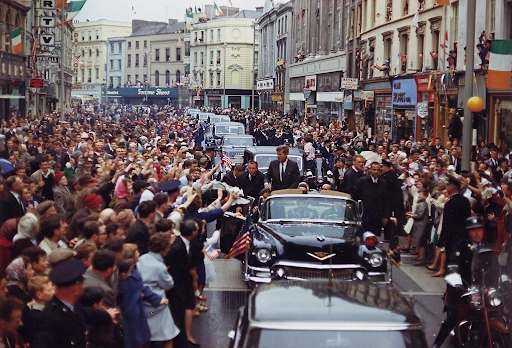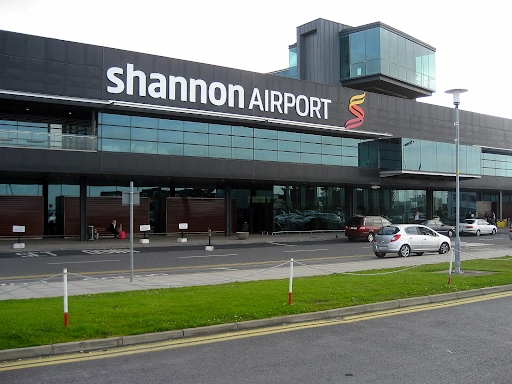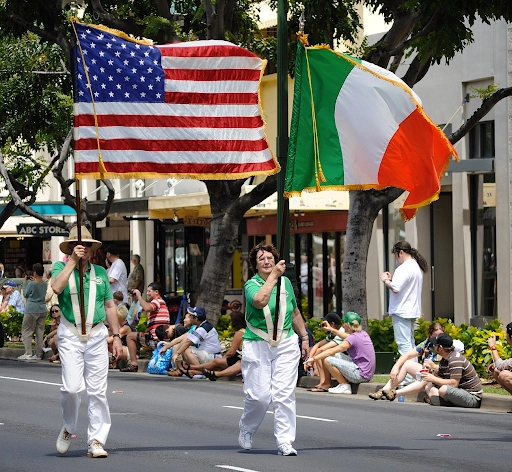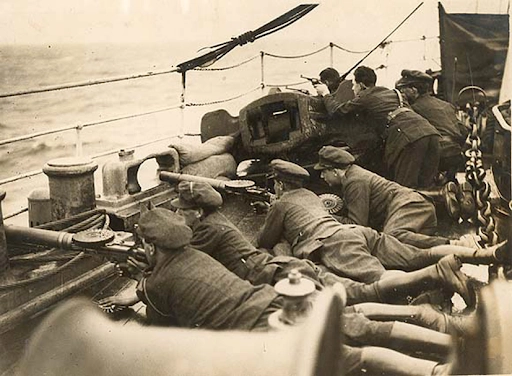Relations between the U.S. and Ireland have traditionally been strong, thanks to common ancestral ties, history and shared values. Irish citizens immigrated to the thirteen Colonies, fought in the War of Independence and were among the first to drive cattle westward. Prompted largely by the Great Irish Famine, from 1820 to 1860 two million Irish arrived in the United States. These ties have been strengthened throughout the years by scientific and educational agreements as well as business and economic advances. American multinational corporations have established subsidiaries in the Emerald Isle to take advantage of low taxation; the U.S. is Ireland’s largest export partner and second-largest import partner.
But U.S.-Irish relations have not always been as comfortable as the proverbial “warm words on a cold evening, a full moon on a dark night.” Areas of bilateral dispute have concerned aviation landing rights, the support of some Americans for the Irish Republican Army, and differences in business practices and cultures that have complicated commerce between the two nations.
As the Economic Counselor and later DCM in Dublin from 1969-1974, Roger A. Sorenson had a close-up view of these conflicts. Charles Stuart Kennedy interviewed Sorenson in September 1990.
Please follow the links to read more about Ireland, aviation, the Marshall Plan, and revolutionary forces.
“My role was to be the unfeeling and unbending representative of the Department”
Roger A. Sorenson, Economic Counselor and DCM, Dublin, 1969-1974
I was assigned there [Dublin, Ireland] originally as the economic counselor…. Ireland at the time was in the process of joining the European Economic Community, which meant that there would be a gradual realignment of Irish trade away from traditional trading partners in favor of those within the European Community. Since I had been working on trade matters, the assignment seemed to be a good fit on that score.

In addition, the United States and Ireland were deeply involved in a long-standing dispute having to do with airline landing rights. In the aftermath of the Second World War, the Irish had negotiated a treaty with the United States that was extraordinarily favorable to Ireland, allowing Irish airlines to land in Boston, Chicago, and New York while restricting American airlines to Shannon, which of course is not where the Irish population is.
I was assigned there [Dublin, Ireland] originally as the economic counselor…. Ireland at the time was in the process of joining the European Economic Community, which meant that there would be a gradual realignment of Irish trade away from traditional trading partners in favor of those within the European Community. Since I had been working on trade matters, the assignment seemed to be a good fit on that score.
In addition, the United States and Ireland were deeply involved in a long-standing dispute having to do with airline landing rights. In the aftermath of the Second World War, the Irish had negotiated a treaty with the United States that was extraordinarily favorable to Ireland, allowing Irish airlines to land in Boston, Chicago, and New York while restricting American airlines to Shannon, which of course is not where the Irish population is.
The result of this arrangement was that the bulk of the traffic was with the Irish carrier. We were determined… to renegotiate the agreement to get landing rights for our airlines in Dublin as well as Shannon…
[The airline negotiation] was one of my major fields of activity while I was there. The Treaty itself contained a clause that allowed either side to give notice of termination. The only thing you can do in a situation like this, then, is threaten to invoke the clause of termination if the other side is unwilling to modify the agreement.
However, it was tough. Our government had been trying without success to renegotiate the treaty for several years. And the reason that our negotiators had failed was that the Irish were especially skilled in mobilizing the Irish- American lobby in the United States…
They had played the State Department off for years by the simple tactic of agreeing to discuss the treaty a year later, the year agreed to always coinciding with congressional elections, at which time congressional candidates from districts with large numbers of Irish-Americans would unfailingly signal the State Department that it was an inopportune moment to try to change the treaty.
It took us five years, but we finally broke their pattern of maneuvering to negotiate only on election years and succeeded in getting the treaty rewritten. I was on the inaugural flight of the first TWA plane to land on a scheduled flight to Dublin.
[The renegotiation was achieved], not to put too fine a point on it, by playing hardball. First, by breaking the pattern of negotiations so that treaty reviews no longer coincided with U.S. domestic elections, then by threatening their rights in either Chicago or Boston at a time when congressmen with large Irish- American constituencies could afford to ignore the issue.
It was an interesting experience. Between the Ambassador [John D. Moore, Ambassador to Ireland 1969-1975] and myself, we deliberately agreed to play differing roles to ease the process. [T]hat is, to be at once tough but not too destructive of Irish-American relations.
My role was to be the unfeeling and unbending representative of the Department, ruthlessly pressing its demands, while the Ambassador’s role was to be that of the peacemaker, whose aim was to find an accommodation that everyone could live with. By making extreme demands and by making them public through the media, we created an atmosphere that allowed the Irish government to acquiesce to a less extreme outcome or settlement, one that we had already determined would still be satisfactory in terms of U.S. interests.
“The support that the IRA receives in the United States has been a source of considerable and genuine embarrassment to the Irish government”

[The Irish lobby was] very effective, to say the least. As I think I’ve suggested, the landing rights issue had gone on since the Second World War and was not finally resolved until the early seventies, due entirely to the effectiveness of this lobby and the skill of the Irish government in mobilizing it…
And this was not the only area where the lobby had looked after the “auld” country.
I found, for example, that Ireland had benefited from the Marshall Plan even though it was not one of the belligerents, had suffered no war damage, and had remained neutral….
In any event, when it came time to rebuild Europe following the war, Congress guaranteed that the Irish would be among the beneficiaries of American largesse, notwithstanding their lack of involvement in the war. Thanks to the Irish lobby, they received a fairly substantial loan.
It would be unfair, however, to suggest that the Irish lobby always acts at the behest of the Irish government. In particular, the support that the IRA receives in the United States has been a source of considerable and genuine embarrassment to the Irish government…
I remember attending a meeting in Seattle where the Irish Consul from San Francisco argued all evening with IRA supporters from the Irish-American community, imploring them to discontinue supporting the IRA, noting that the continuing terrorism and killing in Ireland and the UK is largely financed by the Irish-American community. The Consul’s pleas fell largely on deaf ears.
There was a great deal of violence during my tour of duty in Ireland, and inevitably members of Congress would arrive demanding to go wherever they thought there might be a photo opportunity, usually to a funeral, a demonstration, or sometimes even to the border to be photographed looking at British outposts.
On occasion, their activities were directly contrary to the wishes of the Irish government, which made its views known to us while turning a blind eye to the offending activities of the congressional member. It was the way the game was played, but it was certainly a demonstration of the power of the Irish-American vote in the United States as perceived not only by members of Congress but by the Irish government as well.
In short, the Irish government could mobilize this constituency for its own purposes in certain areas; in other areas, however, they contravened its interests.
“To involve ourselves would have been the ultimate in folly”
I don’t recall ever receiving instructions on this difficult issue [Northern Ireland] from the State Department, which wisely wanted to remain neutral. I became DCM after I’d been there about a year, so I would have been in a position to see everything that came and went out in the way of instructions and reports.
The ambassador, John D. J. Moore, was an extraordinarily decent man, and he himself was of Irish extraction…. More importantly, Ambassador Moore was very well connected, not only with [Eamon] de Valera [Former president of Ireland, seen right] but with several others in the Irish government who were the fathers, one might say, of the modern Irish state — men who had been present at the founding of the state and had worked to bring about the revolution.
I mention this to illustrate that Moore had enormous sympathy for Irish aspirations, but he also understood that the Ireland that they had created was one which recognized the division of the country on the basis of which the predominantly Protestant counties of the north had remained, at least for the time being, within the United Kingdom.
This division was part of the settlement between the Republic and the UK, but the fact of the settlement remains to this day a major source of contention within the Republic, and its major political parties have their roots in the ideological views they held at the time with respect to the settlement. It would ill behoove a foreign government to involve itself in this internal debate.
Indeed, the two major political parties in Ireland — the Fianna Fail and Fine Gael — have their origin in that historic conflict [Irish Civil War]. And to give you some notion of the intensity of Irish politics, consider for a moment that, at the time I was stationed in Ireland, the fathers of some of the party leaders who were sitting in the Irish Parliament, or Dail, had actually put one another before firing squads during the civil war.
One could therefore understand that their sons still felt deeply about the political issues that continue to define the two parties, which was all the more reason for us to remain aloof.
The one point that both parties had agreed to, happily, was that the only way to settle the long outstanding problem of the North was through negotiation, not by violence, as advocated by the IRA.
This is not to say that Ambassador Moore did not occasionally dream of trying somehow to play a mediating role, especially when the violence became particularly appalling….
My advice was that this was a tribal conflict that had gone on in one form or another for several hundred years, at least since the invasion of Strong Bow. Essentially, it was a struggle between two tribes. In its present form it was a continuation of the religious wars of three centuries earlier, which had also been expressions of political and/or tribal identity.
The last thing that the United States should or could do would be to become involved, especially since no national interests of our own were at stake. To involve ourselves would have been the ultimate in folly.
“In our case, the IRA crowd on one occasion poured pigs’ blood over our steps”
The Irish government itself viewed the IRA as an illegal organization, and still does. We could hardly view it otherwise… Of course, the original Irish Republican Army had played a crucial role in the struggle for independence, and a number of the older Irish political leaders whom I knew, such as de Valera, had been IRA officers. He still attended almost weekly the funerals of former comrades in arms while I was there.
The modern IRA broke off from the original group, took over its name and the aura of its history, and has continued a militant struggle against the settlement that came out of the civil war….

Interestingly, it was split into a number of splinter groups, some of which had a strong Marxist orientation. Clearly they were tied as well with other terrorist organizations around the world, even operating joint training camps in some cases.
I might note that the IRA group that identified itself as Marxist was quite hostile toward the United States. Since it obviously thought of itself as a liberation movement, it was especially active in its opposition to the United States, particularly because of what it saw as our imperialist role in Vietnam.
For me, it was an interesting period. Like other American embassies around the world, we saw frequent antiwar demonstrations. In our case, the IRA crowd on one occasion poured pigs’ blood over our steps. Even so, we fared better than the British embassy some blocks down the street and around the corner, which they burned to the ground after three days of demonstrations over incidents in Northern Ireland.
More seriously for us, we had an American sailor shot in Dublin during the visit of a small naval group. Beyond this, the media was definitely opposed to the Vietnam War, which made for an unpleasant atmosphere at times. Finally, while members of the government were personally friendly, they too made it quite clear that there could be no sympathy for the American course in Asia.
“In Ireland, the labor movement… is divided into numerous, rather small union organizations, any one of which can bring work in a company to a halt”
Ireland had a very active program aimed at promoting foreign investment, so we had a large number of American businesses located throughout the republic whose representatives frequently sought our advice on various problems that might arise with the Irish Development Authority or with Irish labor unions. We were, thus, continually involved in interceding or working behind the scenes to promote commercial ties and American direct investment.
In Ireland, the labor movement is highly fractured. That is, it is divided into numerous, rather small union organizations, any one of which can bring work in a company to a halt. There was a separate union for elevator operators, for example, and even though a company settled its differences with all the other unions with which it dealt, the elevator operators could bring work to a halt it they chose, as could the union that represented truck drivers, or janitors, or electrical workers, etc.
In the United States, if a company once settles with the federation representing these different trades — the AFL- CIO, for example — the business can depend on the overall agreement being adhered to for its duration, which is usually two or three years.
Not so in Ireland. Some small group of workers in a plant were always closing things down, holding the whole operation (including their fellow workers) hostage to their own narrow demands.
Perhaps even more outrageous, because the redundancy pay that workers could expect when companies folded their operations was extraordinarily generous under Irish law, one not infrequently encountered labor problems where some particular group had coldly calculated that they would put a company out of business in order to collect the redundancy pay rather than continue to work. I confess that there were occasions when the situation struck me as unreal.
“Pretentiousness can be deadly; so, however, can success, because it quickly generates jealousy”

Certainly, American firms had to know how to operate when they went there and what to expect. The Irish mentality was not an American mentality and there were a number of American companies who became disillusioned and left.
The only way one could handle the problem was to be absolutely honest, which meant warning them of the hazards.
I should mention that the Irish government through its Development Authority encouraged foreign investment through a program of substantial subsidies and other inducements.
This included the establishment of duty-free zones from which to penetrate the European Community which Ireland had just joined, generous cash grants, free training for workers, and tax-free status for an initial period of up to seven years. We tried to point out that these inducements had to be balanced against certain disadvantages, particularly those having to do with the labor force, especially in rural Ireland.
There is a peculiarly small town attitude at work in Ireland where, even in the larger cities, everyone seems to know everyone else. Much of Irish humor is based upon this quality in the Irish people; they like to cut one another down to size; pretentiousness can be deadly; so, however, can success, because it quickly generates jealousy.
For example, I knew an Irish entrepreneur who had worked for an American food company and who then returned to Ireland to develop a highly successful mushroom-producing facility and a greenhouse operation producing tomatoes — products that were not then grown in Ireland, except seasonally in the case of the tomatoes.
At some point, someone — perhaps one of this man’s employees or a neighbor — put chemicals in the water supply and destroyed his entire crop. It was sheer local jealousy and a wish to “cut him down a notch,” as they would say, that led to it. Worse, it may well have been done by people who purported to be his friends. American firms ran into this same sort of pettiness if they weren’t careful…
Senator Kennedy visited Ireland while I was stationed there. The Irish adored the Kennedys. Several presidents have been of Irish extraction, but Kennedy (seen above, left, in Cork) was the first who was also Catholic, which carries with it a tribal identification in Ireland. This was the reason that John Kennedy ignited a such a flame there. If you traveled in the country you’d find in humble cottages a picture of the Pope, one of the sacred heart of Jesus, and a third of President Kennedy.
